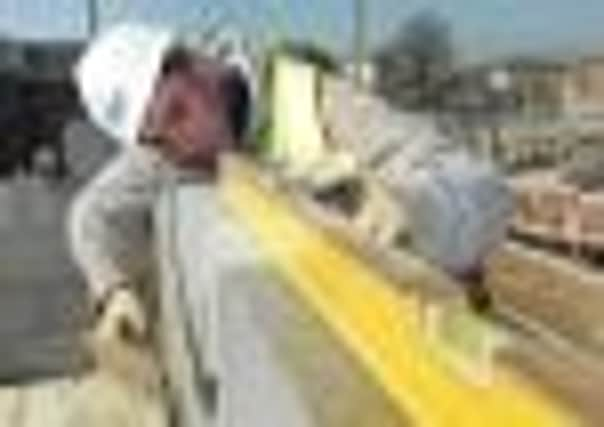Bovis heading south as the divide grows


The builder said at some of its northern developments, such as a site in Selby, it has written off making a profit, reinforcing its decision to head south.
Bovis yesterday reported a 74 per cent surge in 2011 pre-tax profits to £32.1m, and said profitability will continue to accelerate as it increases output in the south and sells more family homes. Revenues grew 22 per cent to £364.8m.
Advertisement
Hide AdAdvertisement
Hide AdChief executive David Ritchie said while it is not completely ruling out developments in the north, Bovis makes far better returns in the south.
“You’ve got to make a strategic decision to be out or in and we at the moment are out,” said Mr Ritchie. He added it does not make sense for the group, one of the UK’s smaller listed housebuilders, to retain a satellite presence even in relatively robust areas of Yorkshire, such as Harrogate.
“Unashamedly, we are saying the south is a stronger market than the north,” he said. “(But) the north is not a dead zone. We’ve still got assets we are operating in the north and we will trade them over time.”
Mr Ritchie said Bovis has effectively written off making any returns at a 300-home site in Selby. “It’s okay but we’ve got to price it accordingly,” he said. “It’s a written down site.”
Advertisement
Hide AdAdvertisement
Hide AdDuring 2011, Bovis’s sites in the south sold 0.55 homes per outlet per week. That compared with a rate of 0.31 in the north and the Midlands, and just 0.2 homes in parts of Yorkshire and Lincolnshire.
“It’s just a general understanding that the south is a more robust market,” he said.
Bovis’s southern focus echoes a growing trend among housebuilders to focus on the south, where house prices have held up better and unemployment is lower.
The group said its land bank of 13,723 plots represents 6.7 years of supply, and 72 per cent is in the south.
Advertisement
Hide AdAdvertisement
Hide AdBovis sold eight per cent more houses in 2011 with 2,045 legal completions. Its average price increased five per cent to £180,100, and its average number of active outlets increased 11 per cent to 73.
Bovis said its success will not be dependent on a general pick-up in the housing market, but its own self-help measures.
It started 2012 having forward sold 568 homes, up 35 per cent on a year earlier. Active outlets have increased to 83, and private reservations in the first eight weeks of the year are up 41 per cent.
“We can see a pretty positive outlook for the business in 2012,” said Mr Ritchie.
Advertisement
Hide AdAdvertisement
Hide AdThe group ended the year with net cash of £50.8m, broadly level with a year earlier.
“There’s absolutely no point having cash on the balance sheet in the long term,” admitted Mr Ritchie, saying the builder will continue to invest it in land where it can make good returns.
“That gives us confidence we can continue to invest aggressively in the land market whilst not significantly gearing the balance sheet.”
The group said it welcomes Government moves to boost the housing market, such as its soon-to-launch mortgage indemnity scheme.
Advertisement
Hide AdAdvertisement
Hide AdBovis has £38.7m of shared equity on its balance sheet, where it has shared some of the deposit burden with first-time buyers. This is up from £31m a year ago.
Mr Ritchie said housebuilders are having to fill the gaps in a tough mortgage market.
“Fundamentally, we should not be in the space,” he said. “It’s got to be seen as a wartime product and you do it when you have to.”
He added Bovis has seen less than five defaults since it started offering shared equity products. “That tells us that the people using it are capable of repaying their mortgage.”
Advertisement
Hide AdAdvertisement
Hide AdThe group hiked its dividend by 67 per cent to 5p per share.
Shares in the builder closed up 4.5p at 510p.
Shore Capital analyst Jon Bell said Bovis remains “overcapitalised compared to its peers”, because of its long land bank and £51m of cash.
“While management is making efforts to address this issue, by increasing the number of open sites and reducing exposure to larger more capital intensive sites, we believe the company has some way to go to reach an appropriate capital structure,” he said.
“In our view, Bovis would be a more attractive investment proposition with a restructured balance sheet, something that could be effected through a redistribution of cash to shareholders.”
York-based housebuilder Persimmon is due to give its take on the housing market today when it reports 2011 figures.